Analyzing the Fatal Flaw of Neoliberalism: An Economics Debate
VerifiedAdded on 2021/04/17
|6
|1395
|93
Essay
AI Summary
This essay examines the debate surrounding neoliberalism, focusing on Dani Rodrik's critique of its economic flaws and Ellen Meiksins Wood's defense. Rodrik argues against the concept, claiming it lacks a solid economic foundation and highlighting the importance of political factors such as equality and justice. He contrasts this with the success of nations that embraced globalization. Wood, however, challenges Rodrik's assumptions, emphasizing the crucial role of government intervention in capitalism and arguing that the market should be viewed as an imperative rather than an opportunity. The essay analyzes their differing perspectives on market dynamics, government involvement, and the implications for understanding modern capitalism, drawing on their published works and exploring how they define and perceive the capitalist market. The conclusion emphasizes how human needs are subordinate to capital accumulation and subject to crises and inconsistencies associated with an anarchic aggressive market.
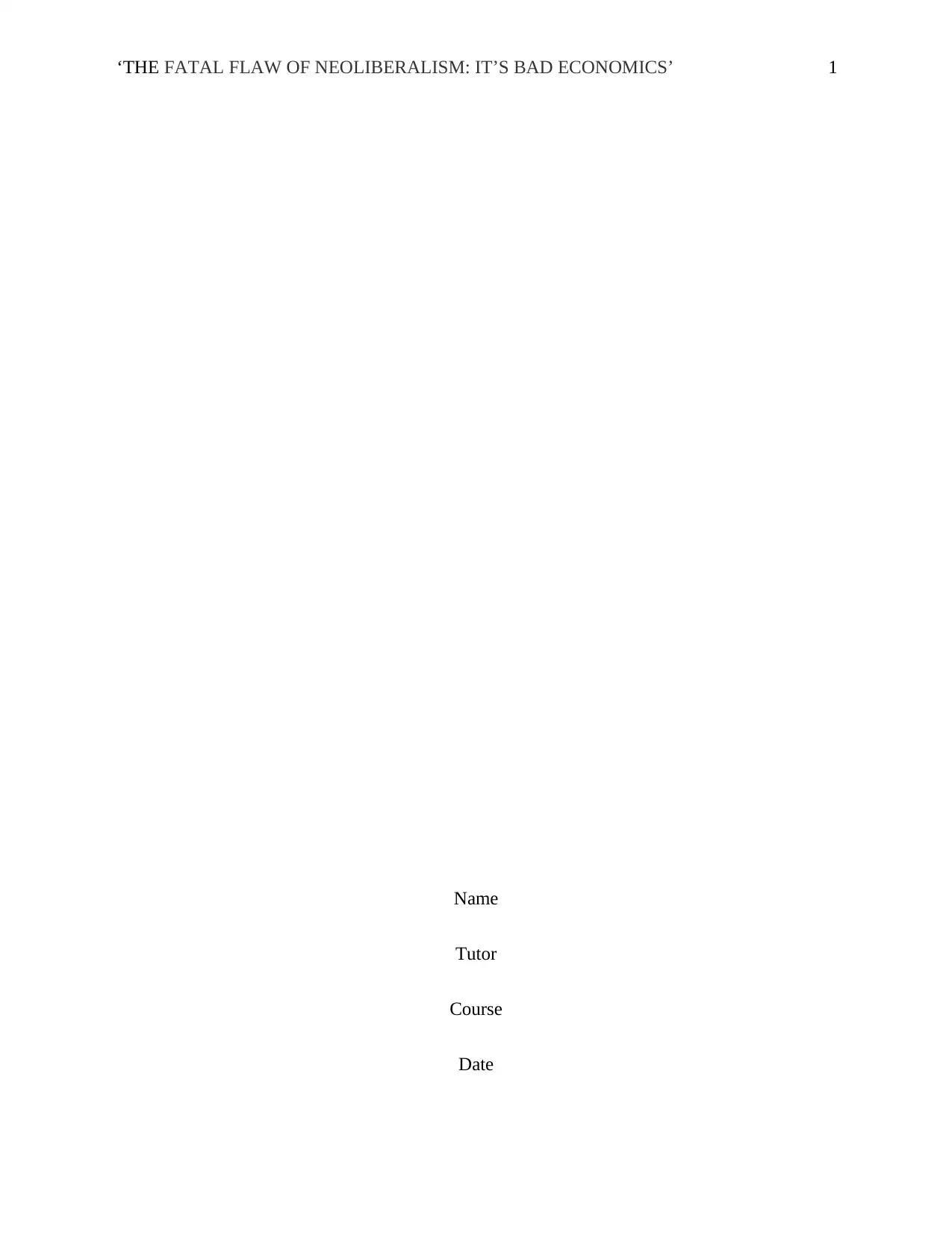
‘THE FATAL FLAW OF NEOLIBERALISM: IT’S BAD ECONOMICS’ 1
Name
Tutor
Course
Date
Name
Tutor
Course
Date
Paraphrase This Document
Need a fresh take? Get an instant paraphrase of this document with our AI Paraphraser
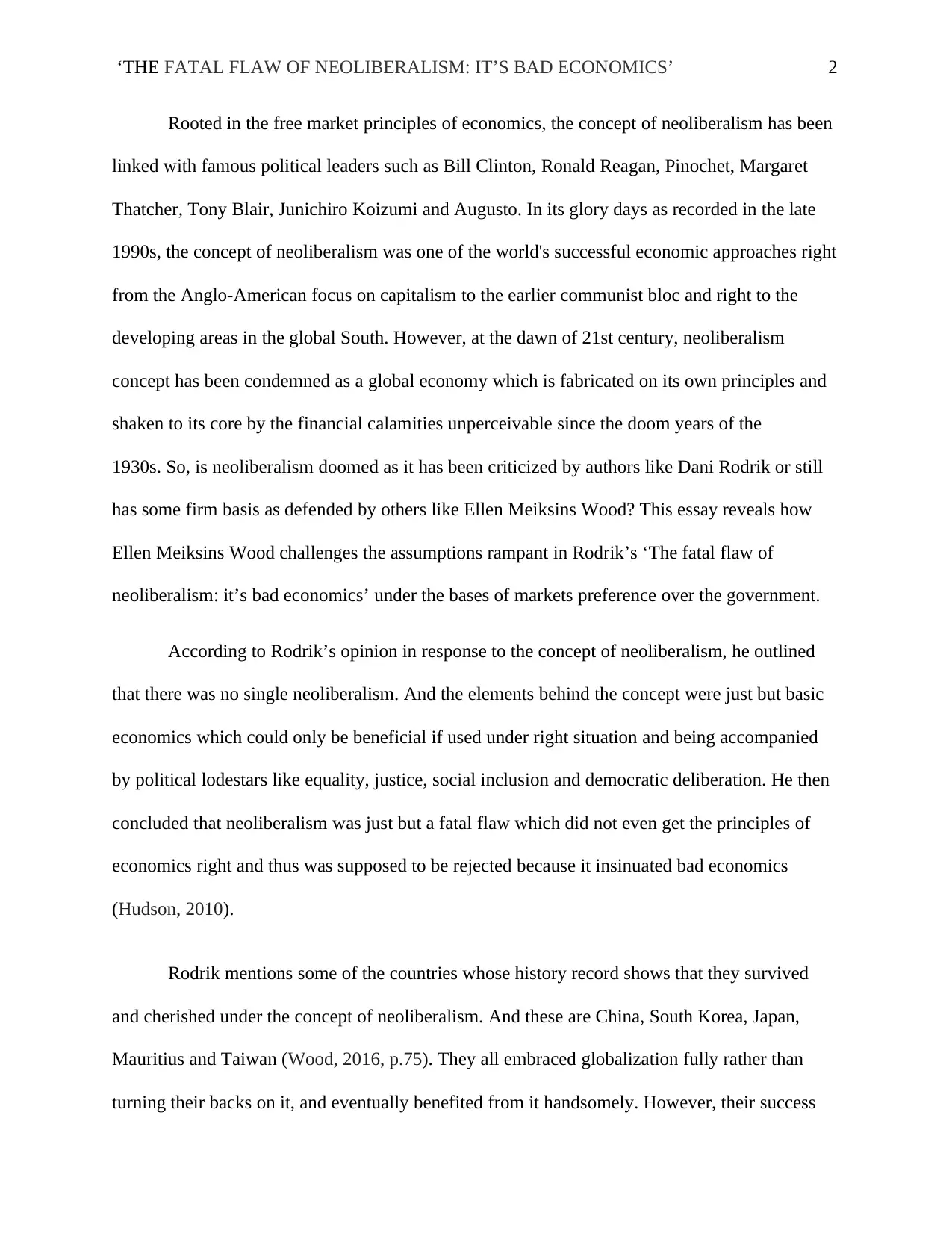
‘THE FATAL FLAW OF NEOLIBERALISM: IT’S BAD ECONOMICS’ 2
Rooted in the free market principles of economics, the concept of neoliberalism has been
linked with famous political leaders such as Bill Clinton, Ronald Reagan, Pinochet, Margaret
Thatcher, Tony Blair, Junichiro Koizumi and Augusto. In its glory days as recorded in the late
1990s, the concept of neoliberalism was one of the world's successful economic approaches right
from the Anglo-American focus on capitalism to the earlier communist bloc and right to the
developing areas in the global South. However, at the dawn of 21st century, neoliberalism
concept has been condemned as a global economy which is fabricated on its own principles and
shaken to its core by the financial calamities unperceivable since the doom years of the
1930s. So, is neoliberalism doomed as it has been criticized by authors like Dani Rodrik or still
has some firm basis as defended by others like Ellen Meiksins Wood? This essay reveals how
Ellen Meiksins Wood challenges the assumptions rampant in Rodrik’s ‘The fatal flaw of
neoliberalism: it’s bad economics’ under the bases of markets preference over the government.
According to Rodrik’s opinion in response to the concept of neoliberalism, he outlined
that there was no single neoliberalism. And the elements behind the concept were just but basic
economics which could only be beneficial if used under right situation and being accompanied
by political lodestars like equality, justice, social inclusion and democratic deliberation. He then
concluded that neoliberalism was just but a fatal flaw which did not even get the principles of
economics right and thus was supposed to be rejected because it insinuated bad economics
(Hudson, 2010).
Rodrik mentions some of the countries whose history record shows that they survived
and cherished under the concept of neoliberalism. And these are China, South Korea, Japan,
Mauritius and Taiwan (Wood, 2016, p.75). They all embraced globalization fully rather than
turning their backs on it, and eventually benefited from it handsomely. However, their success
Rooted in the free market principles of economics, the concept of neoliberalism has been
linked with famous political leaders such as Bill Clinton, Ronald Reagan, Pinochet, Margaret
Thatcher, Tony Blair, Junichiro Koizumi and Augusto. In its glory days as recorded in the late
1990s, the concept of neoliberalism was one of the world's successful economic approaches right
from the Anglo-American focus on capitalism to the earlier communist bloc and right to the
developing areas in the global South. However, at the dawn of 21st century, neoliberalism
concept has been condemned as a global economy which is fabricated on its own principles and
shaken to its core by the financial calamities unperceivable since the doom years of the
1930s. So, is neoliberalism doomed as it has been criticized by authors like Dani Rodrik or still
has some firm basis as defended by others like Ellen Meiksins Wood? This essay reveals how
Ellen Meiksins Wood challenges the assumptions rampant in Rodrik’s ‘The fatal flaw of
neoliberalism: it’s bad economics’ under the bases of markets preference over the government.
According to Rodrik’s opinion in response to the concept of neoliberalism, he outlined
that there was no single neoliberalism. And the elements behind the concept were just but basic
economics which could only be beneficial if used under right situation and being accompanied
by political lodestars like equality, justice, social inclusion and democratic deliberation. He then
concluded that neoliberalism was just but a fatal flaw which did not even get the principles of
economics right and thus was supposed to be rejected because it insinuated bad economics
(Hudson, 2010).
Rodrik mentions some of the countries whose history record shows that they survived
and cherished under the concept of neoliberalism. And these are China, South Korea, Japan,
Mauritius and Taiwan (Wood, 2016, p.75). They all embraced globalization fully rather than
turning their backs on it, and eventually benefited from it handsomely. However, their success
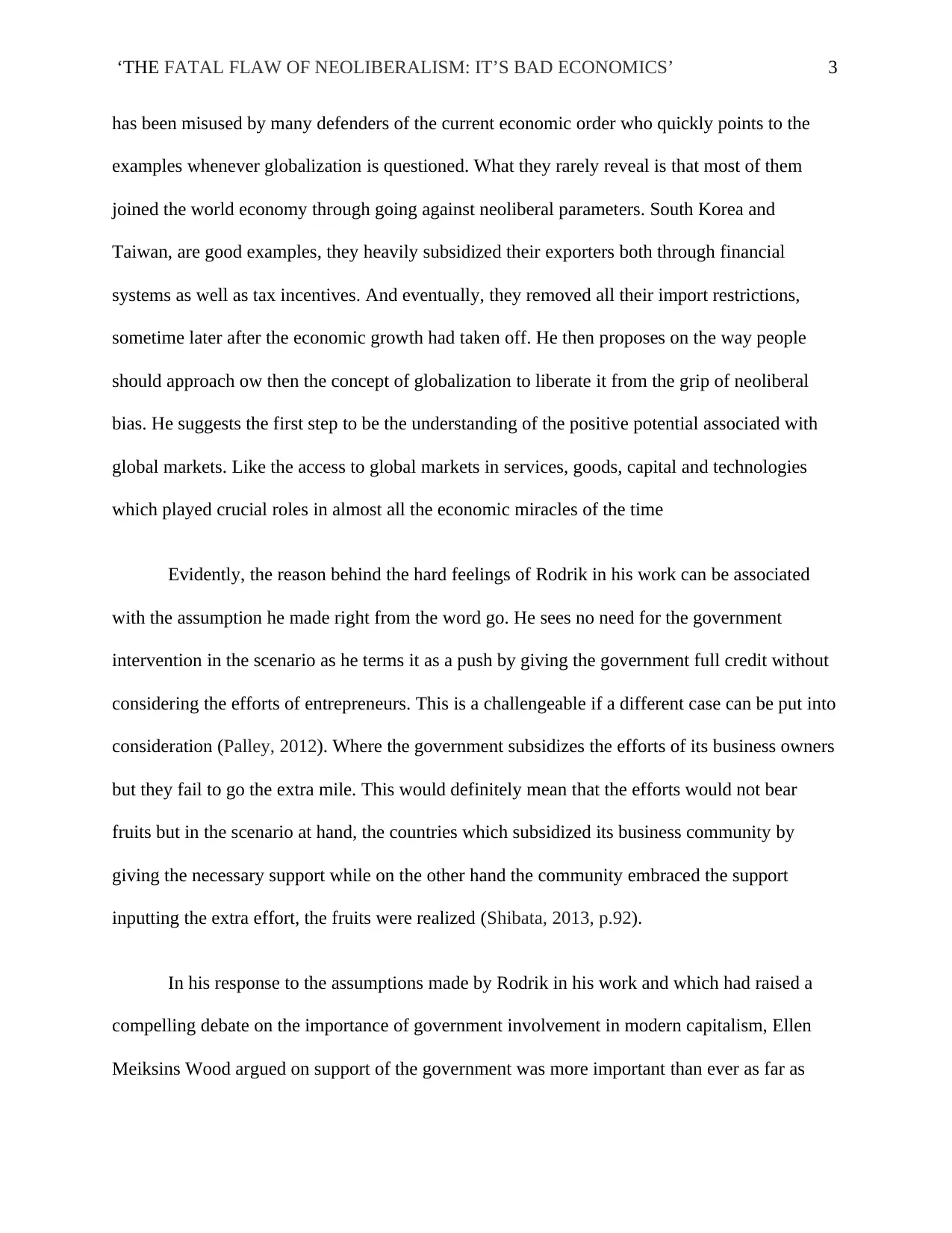
‘THE FATAL FLAW OF NEOLIBERALISM: IT’S BAD ECONOMICS’ 3
has been misused by many defenders of the current economic order who quickly points to the
examples whenever globalization is questioned. What they rarely reveal is that most of them
joined the world economy through going against neoliberal parameters. South Korea and
Taiwan, are good examples, they heavily subsidized their exporters both through financial
systems as well as tax incentives. And eventually, they removed all their import restrictions,
sometime later after the economic growth had taken off. He then proposes on the way people
should approach ow then the concept of globalization to liberate it from the grip of neoliberal
bias. He suggests the first step to be the understanding of the positive potential associated with
global markets. Like the access to global markets in services, goods, capital and technologies
which played crucial roles in almost all the economic miracles of the time
Evidently, the reason behind the hard feelings of Rodrik in his work can be associated
with the assumption he made right from the word go. He sees no need for the government
intervention in the scenario as he terms it as a push by giving the government full credit without
considering the efforts of entrepreneurs. This is a challengeable if a different case can be put into
consideration (Palley, 2012). Where the government subsidizes the efforts of its business owners
but they fail to go the extra mile. This would definitely mean that the efforts would not bear
fruits but in the scenario at hand, the countries which subsidized its business community by
giving the necessary support while on the other hand the community embraced the support
inputting the extra effort, the fruits were realized (Shibata, 2013, p.92).
In his response to the assumptions made by Rodrik in his work and which had raised a
compelling debate on the importance of government involvement in modern capitalism, Ellen
Meiksins Wood argued on support of the government was more important than ever as far as
has been misused by many defenders of the current economic order who quickly points to the
examples whenever globalization is questioned. What they rarely reveal is that most of them
joined the world economy through going against neoliberal parameters. South Korea and
Taiwan, are good examples, they heavily subsidized their exporters both through financial
systems as well as tax incentives. And eventually, they removed all their import restrictions,
sometime later after the economic growth had taken off. He then proposes on the way people
should approach ow then the concept of globalization to liberate it from the grip of neoliberal
bias. He suggests the first step to be the understanding of the positive potential associated with
global markets. Like the access to global markets in services, goods, capital and technologies
which played crucial roles in almost all the economic miracles of the time
Evidently, the reason behind the hard feelings of Rodrik in his work can be associated
with the assumption he made right from the word go. He sees no need for the government
intervention in the scenario as he terms it as a push by giving the government full credit without
considering the efforts of entrepreneurs. This is a challengeable if a different case can be put into
consideration (Palley, 2012). Where the government subsidizes the efforts of its business owners
but they fail to go the extra mile. This would definitely mean that the efforts would not bear
fruits but in the scenario at hand, the countries which subsidized its business community by
giving the necessary support while on the other hand the community embraced the support
inputting the extra effort, the fruits were realized (Shibata, 2013, p.92).
In his response to the assumptions made by Rodrik in his work and which had raised a
compelling debate on the importance of government involvement in modern capitalism, Ellen
Meiksins Wood argued on support of the government was more important than ever as far as
⊘ This is a preview!⊘
Do you want full access?
Subscribe today to unlock all pages.

Trusted by 1+ million students worldwide
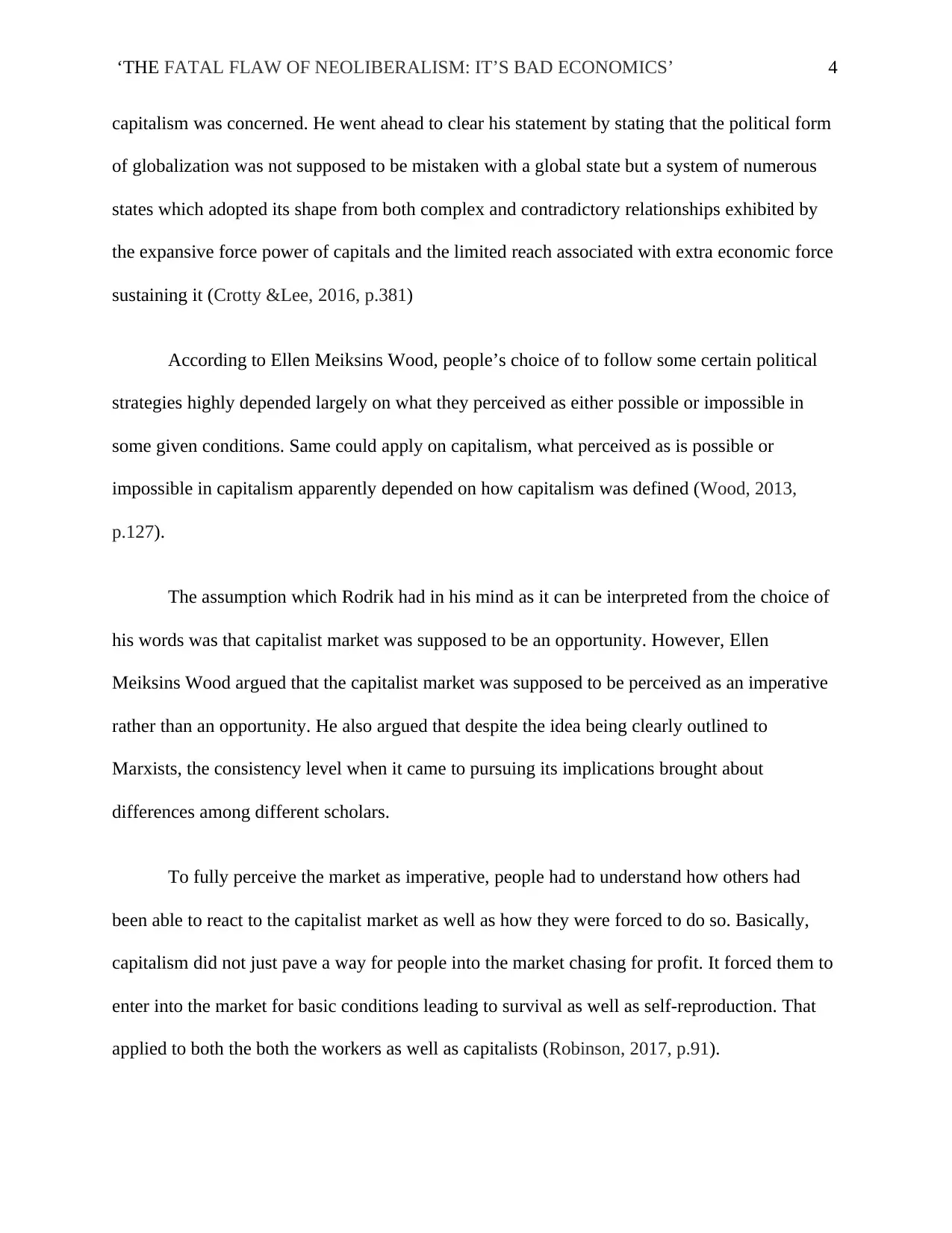
‘THE FATAL FLAW OF NEOLIBERALISM: IT’S BAD ECONOMICS’ 4
capitalism was concerned. He went ahead to clear his statement by stating that the political form
of globalization was not supposed to be mistaken with a global state but a system of numerous
states which adopted its shape from both complex and contradictory relationships exhibited by
the expansive force power of capitals and the limited reach associated with extra economic force
sustaining it (Crotty &Lee, 2016, p.381)
According to Ellen Meiksins Wood, people’s choice of to follow some certain political
strategies highly depended largely on what they perceived as either possible or impossible in
some given conditions. Same could apply on capitalism, what perceived as is possible or
impossible in capitalism apparently depended on how capitalism was defined (Wood, 2013,
p.127).
The assumption which Rodrik had in his mind as it can be interpreted from the choice of
his words was that capitalist market was supposed to be an opportunity. However, Ellen
Meiksins Wood argued that the capitalist market was supposed to be perceived as an imperative
rather than an opportunity. He also argued that despite the idea being clearly outlined to
Marxists, the consistency level when it came to pursuing its implications brought about
differences among different scholars.
To fully perceive the market as imperative, people had to understand how others had
been able to react to the capitalist market as well as how they were forced to do so. Basically,
capitalism did not just pave a way for people into the market chasing for profit. It forced them to
enter into the market for basic conditions leading to survival as well as self-reproduction. That
applied to both the both the workers as well as capitalists (Robinson, 2017, p.91).
capitalism was concerned. He went ahead to clear his statement by stating that the political form
of globalization was not supposed to be mistaken with a global state but a system of numerous
states which adopted its shape from both complex and contradictory relationships exhibited by
the expansive force power of capitals and the limited reach associated with extra economic force
sustaining it (Crotty &Lee, 2016, p.381)
According to Ellen Meiksins Wood, people’s choice of to follow some certain political
strategies highly depended largely on what they perceived as either possible or impossible in
some given conditions. Same could apply on capitalism, what perceived as is possible or
impossible in capitalism apparently depended on how capitalism was defined (Wood, 2013,
p.127).
The assumption which Rodrik had in his mind as it can be interpreted from the choice of
his words was that capitalist market was supposed to be an opportunity. However, Ellen
Meiksins Wood argued that the capitalist market was supposed to be perceived as an imperative
rather than an opportunity. He also argued that despite the idea being clearly outlined to
Marxists, the consistency level when it came to pursuing its implications brought about
differences among different scholars.
To fully perceive the market as imperative, people had to understand how others had
been able to react to the capitalist market as well as how they were forced to do so. Basically,
capitalism did not just pave a way for people into the market chasing for profit. It forced them to
enter into the market for basic conditions leading to survival as well as self-reproduction. That
applied to both the both the workers as well as capitalists (Robinson, 2017, p.91).
Paraphrase This Document
Need a fresh take? Get an instant paraphrase of this document with our AI Paraphraser
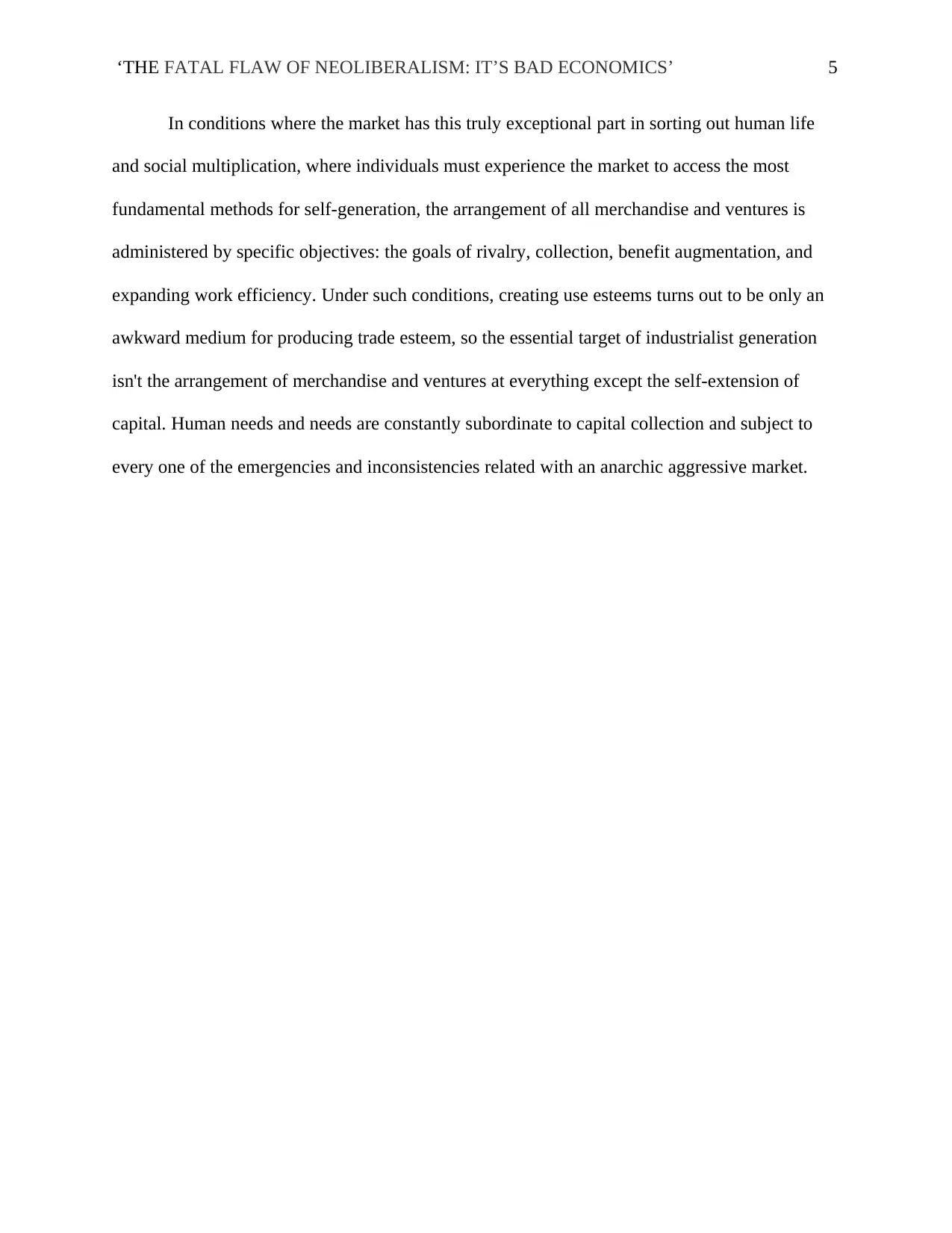
‘THE FATAL FLAW OF NEOLIBERALISM: IT’S BAD ECONOMICS’ 5
In conditions where the market has this truly exceptional part in sorting out human life
and social multiplication, where individuals must experience the market to access the most
fundamental methods for self-generation, the arrangement of all merchandise and ventures is
administered by specific objectives: the goals of rivalry, collection, benefit augmentation, and
expanding work efficiency. Under such conditions, creating use esteems turns out to be only an
awkward medium for producing trade esteem, so the essential target of industrialist generation
isn't the arrangement of merchandise and ventures at everything except the self-extension of
capital. Human needs and needs are constantly subordinate to capital collection and subject to
every one of the emergencies and inconsistencies related with an anarchic aggressive market.
In conditions where the market has this truly exceptional part in sorting out human life
and social multiplication, where individuals must experience the market to access the most
fundamental methods for self-generation, the arrangement of all merchandise and ventures is
administered by specific objectives: the goals of rivalry, collection, benefit augmentation, and
expanding work efficiency. Under such conditions, creating use esteems turns out to be only an
awkward medium for producing trade esteem, so the essential target of industrialist generation
isn't the arrangement of merchandise and ventures at everything except the self-extension of
capital. Human needs and needs are constantly subordinate to capital collection and subject to
every one of the emergencies and inconsistencies related with an anarchic aggressive market.
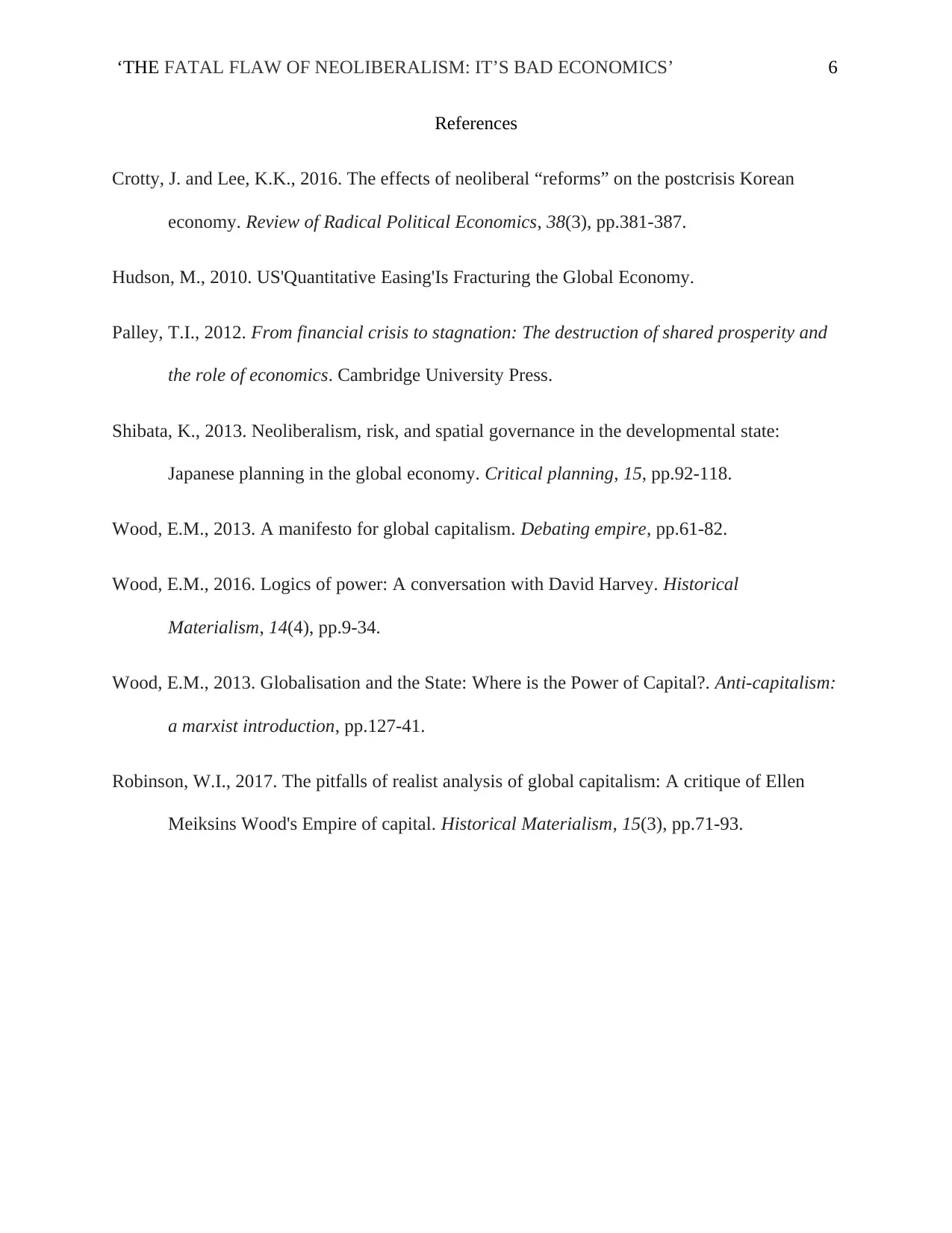
‘THE FATAL FLAW OF NEOLIBERALISM: IT’S BAD ECONOMICS’ 6
References
Crotty, J. and Lee, K.K., 2016. The effects of neoliberal “reforms” on the postcrisis Korean
economy. Review of Radical Political Economics, 38(3), pp.381-387.
Hudson, M., 2010. US'Quantitative Easing'Is Fracturing the Global Economy.
Palley, T.I., 2012. From financial crisis to stagnation: The destruction of shared prosperity and
the role of economics. Cambridge University Press.
Shibata, K., 2013. Neoliberalism, risk, and spatial governance in the developmental state:
Japanese planning in the global economy. Critical planning, 15, pp.92-118.
Wood, E.M., 2013. A manifesto for global capitalism. Debating empire, pp.61-82.
Wood, E.M., 2016. Logics of power: A conversation with David Harvey. Historical
Materialism, 14(4), pp.9-34.
Wood, E.M., 2013. Globalisation and the State: Where is the Power of Capital?. Anti-capitalism:
a marxist introduction, pp.127-41.
Robinson, W.I., 2017. The pitfalls of realist analysis of global capitalism: A critique of Ellen
Meiksins Wood's Empire of capital. Historical Materialism, 15(3), pp.71-93.
References
Crotty, J. and Lee, K.K., 2016. The effects of neoliberal “reforms” on the postcrisis Korean
economy. Review of Radical Political Economics, 38(3), pp.381-387.
Hudson, M., 2010. US'Quantitative Easing'Is Fracturing the Global Economy.
Palley, T.I., 2012. From financial crisis to stagnation: The destruction of shared prosperity and
the role of economics. Cambridge University Press.
Shibata, K., 2013. Neoliberalism, risk, and spatial governance in the developmental state:
Japanese planning in the global economy. Critical planning, 15, pp.92-118.
Wood, E.M., 2013. A manifesto for global capitalism. Debating empire, pp.61-82.
Wood, E.M., 2016. Logics of power: A conversation with David Harvey. Historical
Materialism, 14(4), pp.9-34.
Wood, E.M., 2013. Globalisation and the State: Where is the Power of Capital?. Anti-capitalism:
a marxist introduction, pp.127-41.
Robinson, W.I., 2017. The pitfalls of realist analysis of global capitalism: A critique of Ellen
Meiksins Wood's Empire of capital. Historical Materialism, 15(3), pp.71-93.
⊘ This is a preview!⊘
Do you want full access?
Subscribe today to unlock all pages.

Trusted by 1+ million students worldwide
1 out of 6
Your All-in-One AI-Powered Toolkit for Academic Success.
+13062052269
info@desklib.com
Available 24*7 on WhatsApp / Email
![[object Object]](/_next/static/media/star-bottom.7253800d.svg)
Unlock your academic potential
Copyright © 2020–2026 A2Z Services. All Rights Reserved. Developed and managed by ZUCOL.